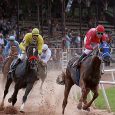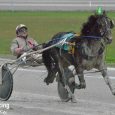As handicappers, we are all trying to find the next best angle or figure that will increase our profits. Many of us keep a stockpile of data to analyze or manipulate to reach our goal of making a living playing the races.
Chances are, you are doing it wrong and falling victim to silent evidence.
What is “silent evidence”? Simply put, it is the notion that we cannot always count on our observations to develop conclusions. We tend to view historical evidence through a filter. That filter helps us to ignore what doesn’t fit our beliefs. This filter gives us a false sense of stability in our handicapping and lowers how we view the risks of past races and wagers.
There is the cliché that “history is written by the winners.” In the case of horse racing, it is safe to say that history is written about the winners. I bet most readers can’t remember the horses that ran second to Justify in his Triple Crown races in 2018 — Good Magic, Bravazo and Gronkowski — let alone what factors worked against them in those races.
As handicappers, we focus on the attributes of the horse that caused it to win. It could be speed figures, pace, trainer moves, a jockey change or any other factor you may be tracking. Yet, if we assume an average field size of eight horses, we are only focusing on 12.5% of all the horses that have run. We are only analyzing the tip of the iceberg!

(Photo by Ryan Dickey.)
In other words, we know much less than we think — dissecting the attributes of a winning horse after the race does offer some benefits, but only when you also analyze the losers. Otherwise, the factors pointing to the winner would not have been positives at the time you were handicapping the race.
Think of those articles that tell you about the steps that will make you a successful CEO. Some have merit, like showing up for work every day and not being a total jackass. Yet, did anyone ever think to track the attributes of failed CEOs? I bet you would find a ton of similarities between them and the success stories in areas such as risk-taking, motivation, drive, optimism and knowledge. Sometimes, you’ll find the differences in things like luck, which no one has control over.
The same holds true for horses.
Rail Guy loves to tell anyone that will listen that, “Da early speed horse wins all da races — never bet on da closers!” While I agree: early speed horses dominate at my home track, Monmouth Park, it isn’t true that every early speed horse will win and that every closer will lose. You need to look at each horse to make sure they fit the race.
What if the closer is stepping up from a $5,000 claimer to an allowance race today? What if there are four early speed horses and three of them are one-dimensional front runners and the fourth one is a strong early speed horse? What if the race doesn’t have a stalker or closer type running today?
Focusing solely on the winners helps the data conceal the effects of randomness. Did that strong early speed horse have a troubled trip? Was he slammed out of the gate, checked twice, and then bumped hard in the stretch? If you focus only on the winner, you’ll never know.
The question shouldn’t just be “why did he win?” but also “why did he lose?” Reviewing our old data on both the winners and losers will make us aware of what is or is not a factor shared exclusively by winners.
So, before you rush to the windows to place a bet on that “sure thing”, make sure you have examined the race to see what previous also-rans can tell you first!



